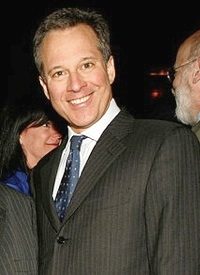
New York's Eric Schneiderman (left) is the only Attorney General who doesn’t like the foreclosure settlement agreed to by the major banks behind the mortgage-backed-securities (MBS) and foreclosure (robo-signing and faked-documents) frauds that helped bring on the economic crisis in 2008. And he is feeling the heat. In exchange for a small fine, the settlement agreement would end the years-long investigations by New York and other states into the frauds, and would prevent them or any of the investors hurt by the frauds from ever bringing additional charges in the future.
But Schneiderman’s investigation into the shady practices behind the development and sale of MBSs isn’t complete, and signing off on such an agreement now would end his efforts and forever protect the banks from further public exposure to their back office practices. Danny Kanner, a spokesman for Schneiderman, said, “The attorney general remains concerned by any attempt at a global settlement that would shut down ongoing investigations of wrongdoing related to the mortgage crisis.” And it’s the “ongoing investigations” that the banks would like to end, and they’re willing to pay a token amount to make the whole issue go away.
In fact, Bank of America has already agreed to a settlement concerning investors and mortgage holders who were hurt by the Countrywide Financial loans, offering to pay $8.5 billion to investors holding the toxic (read: worthless) securities. The remaining balance on those mortgages is $174 billion, but lawyers representing the Federal Reserve Bank of New York, BlackRock, and PIMCO think the deal is fair. But Schneiderman sued to block that deal, holding that it would “compromise investors’ claims in exchange for a payment representing a fraction of the losses” experienced by the investors, and that the deal had been negotiated in back rooms without full knowledge or participation by those investors.
So outraged was one of the members of the Board of the New York Fed, Kathryn Wylde, that she confronted Schneiderman publicly at the funeral service for former New York Governor Hugh Carey, saying,
It is of concern to the industry that instead of trying to facilitate resolving these issues, you [Schneiderman] seem to be throwing a monkey wrench into it. Wall Street is our Main Street — love ‘em or hate ‘em. They are important and we have to make sure we are doing everything we can to support them unless they are doing something indefensible. [Emphasis added.]
For his part, Schneiderman refused to comment on the exchange, but it reflects the pressure being brought to bear on him to get on board and help the banks put the frauds and deceit they performed behind them.
Wylde was joined by Shaun Donovan, the secretary of Obama’s Housing and Urban Development agency, who has also had “discussions” with Schneiderman about his intransigence on the settlement agreements. When Donovan was pressed on the matter, he said the conversations were motivated “by a desire to speed up help for troubled homeowners.” Nothing was said about the banks’ concerns about the lingering litigation that, in the case of the Bank of America at least, was driving its stock price down.
In referring to “help for troubled homeowners,” critics say Donovan was using that as a cover. The total financial settlement for the five big banks involved in the scam who are Bank of America, Citigroup, JPMorgan Chase, Wells Fargo, and Ally (formerly GMAC) was a mere $20 billion, and probably less. It was seriously suggested that some of that money would go toward loan modifications and counseling for homeowners. To put that amount into perspective, it should be noted that at present there are approximately $8.5 trillion in total U.S. mortgage-backed securities. $20 billion in fines, split among the five guilty parties (no admission of guilt can be counted upon to be part of the settlement) would amount to nothing more than a footnote to their financial statements.
The outrage at another hosing of the investors by the proposed settlements was expressed by none other than writer Matt Taibbi in his blog at left-leaning, pro-Obama Rolling Stone magazine.
The idea behind this federally-guided “settlement” is to concentrate and centralize all the legal exposure accrued by this generation of grotesque banker corruption in one place, put one single price tag on it that everyone can live with, and then stuff the details into a titanium canister before shooting it into deep space…
This deal being cooked up is the ultimate Papal indulgence. By the time that $20 billion (if it even ends up being that high) gets divvied up between all the major players, the broadest and most destructive fraud scheme in American history, one that makes the S&L crisis look like a cheap liquor store holdup, will be safely reduced to a single painful but eminently survivable one-time line item for all the major perpetrators.
And Taibbi couldn’t let Wylde’s comment to Schneiderman about the need to “make sure we are doing everything we can to support them [the big banks] unless they are doing something indefensible” go without comment:
Just what would Wylde consider "indefensible," given that stealing is pretty much the worst thing that a bank can do — and these banks just finished the longest and most orgiastic campaign of stealing in the history of money?
No mention has been made of valid and sincere concerns for the homeowners and investors who suffered the consequences of the banks’ behavior. Observers note that if the Obama administration can make this whole issue of fraudulent and deceitful behavior go away, that makes it easier for those banks to bankroll his reelection campaign.



